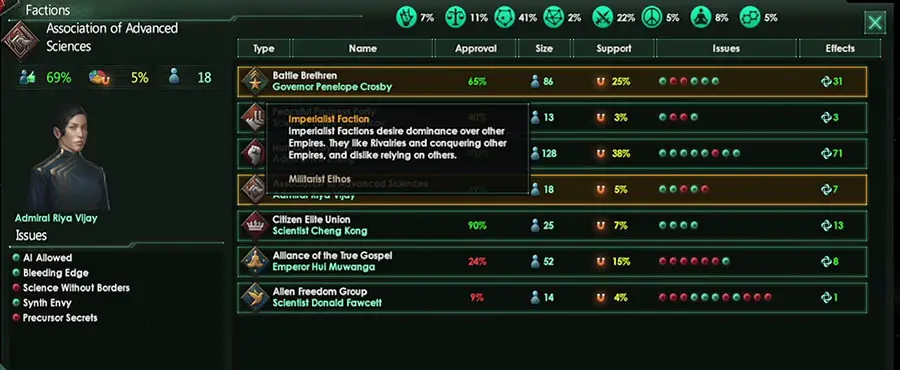
In Stellaris, ethics are the principles an empire lives by and will determine how an empire deals with other empires and with a crisis. Ethics also affect game options that are available to your empire and influences how AI empires will respond to you.
Click the “Manage Faction” button on the factions menu, then select Embrace faction to start changing your ethics. You can do this once every 20 years and it costs 5,000 Unity. At least 20% of your population must support the faction before you can embrace it. Embracing a faction makes all other factions unhappy.
An immediate shift from one extreme to another is not possible, a governing ethics shift must be done in steps. As a faction gains support other factions similar to the supported faction will appear, enabling an empire to take that next step toward the governing ethic it wants to use.
Not every ethic will be available immediately. As an empire moves toward the embraced faction’s ethics some factions will drop in support or disappear completely. Also, as your empire advances, more factions will appear.
A faction can also be promoted or suppressed, which increases or decreases its attraction. A faction is suppressed at no cost, formerly it used to cost 1 influence per month. A faction can also be promoted in preparation for a change in an empire’s governing ethics, again at no cost, but originally it used to cost 2 influence per month. Supporting or suppressing a faction is, in effect, supporting the ethic the faction represents. Faction increases and decreases are determined by the faction’s attraction, -75% if the faction is suppressed and +100% if supported..
One of the biggest reasons to change is ethics is so you can Become the Crisis. The change in ethics to become the crisis can be done but it can take a lot of time and Unity to accomplish.
Types of Ethics
Usually an empire is limited to 3 moderate ethics or 1 fanatical ethic and 1 moderate ethic. Depending on which ethics are active determines which government types and civics are available to an empire. One thing to keep in mind about a regular ethic versus a fanatic ethic is that the ethic effects are doubled for the fanatic version, usually at the cost of losing one faction in your empire.
Ethics fall into 4 broad categories.
Authoritarian-Egalitarian influences how the political power is divvied up. Will it be in the hands of the many or the few?
Materialist-Spiritualist either believes everything in the universe can be explained by science or is there something more to the universe, like a soul?
Militarist-Pacifist determines where your empire falls when it comes to using the military. Will your government decide to use the military to forcibly expand your empire, or will it be used strictly for defense?
Xenophile-Xenophobe, should you trust aliens and work with them or be suspicious of them and exploit them for the greater good (yours, of course).
Read More: Did you know that you can now conduct Espionage in Stellaris?
Militarist
For a Militarist war is usually the answer. Diplomacy is for fools except in the gravest of circumstances, and expansion by force is the norm. The military is held in the highest esteem. Militarists have a distinct advantage when it comes to warfare for obvious reasons. They get a 10% reduction in influence costs when making claims and their ship fire rate is increased by 10%. A Fanatic Militarist gets a 20% reduction in claims cost and a ship firing rate increase of 20%.
A Militarist approach might be good in an early game since it allows you to make more claims for the same amount of influence, which an empire won’t have a lot of at the start of a game, plus the 10% increase in ship firing rate could tip the tide of battle while fleets in the game are still small.
Pacifist
Pacifists don’t believe in the death and destruction wrought by a militaristic approach. They would rather solve problems between empires as peacefully as possible and they will usually only fight defensive wars. Contrary to the Militarist, they enjoy additional stability in their empire and can handle more administrative tasks than most empires. They get a reduction of 15% in empire size and 5 more stability. The Fanatic Pacifist receives a reduction of 30% in empire size and a boost of 10 in stability.
Xenophobes
Xenophobes think diversity is bad. They fear different thoughts and ideas and believe it will undermine the very fabric of their society and therefore strive to keep any other species out of their empire. They will even enslave and purge other aliens as a way to maintain their purity. They get a 20% reduction in starbase influence cost and a 10% increase in population growth. The Fanatic Xenophobe gets a 40% reduction in starbase influence costs and 20% improvement in population growth.
Xenophiles
Xenophiles believe the opposite of Xenophobes and will strive for as much diversity as possible. Any and all aliens are welcome as equals. They believe the fresh ideas they bring prevent their culture from becoming inactive and unfocused. They would much rather deal in diplomacy than war when encountering other empires. They get a 10% increase in trade value and one additional envoy. Fanatic Xenophiles get a 20% boost in trade value and two additional envoys. Another bonus to this ethic is that as this empire gets more diverse species some of the planets it owns with a low habitability rating suddenly become pretty attractive, simply because a race they’ve brought into their culture is better suited to its environment.
Related Article: Is Stellaris the best space strategy game ever? Read my entirely subjective article about space strategy games and why I like the ones I like.
Egalitarian
This ethic wants the decision-making process to be in the hands of as many individuals as possible. They desire total equality for everyone with no hierarchal structure to society. Much of their happiness is derived from social welfare programs. Egalitarians get a 25% boost in faction Unity gain and a 5% improvement in Specialists output. The Fanatic Egalitarians get 50% boost in faction Unity gain and a 10% boost in specialist output.
Authoritarian
Authoritarian. Political power resides in one or a few select individuals. With this type of governing ethic the will of the masses is subject to the will and decisions of the few. An authoritarian government tends to restrict individual liberties and desires a strict societal structure of hierarchy. An authoritarian style of government gives a 5% boost in worker productivity and .5 additional influence per month. The Fanatic Authoritarian gives a 10% boost to worker output and 1 additional influence point per month.
Materialist
A Materialist dismisses any religion as mere superstition and the physical laws of the universe are all that govern our existence. There is no such thing as a soul and the only way to gain true meaning in life is through science and the discovery of the physical things around us. They get a 10% reduction in robot costs and a gain of 5% in research speed. A Fanatic Materialist gets 20% reduction in robot upkeep and a 10% boost in research speed.
Spiritualists
Spiritualists believe essentially the opposite of a Materialist, that everyone has a soul and that this physical reality is not the only reality. They believe they will someday transition to a higher plane of existence. They get an increase of 10% in monthly Unity, 10% reduction in the cost of issuing an edict, plus a 10% reduction in the cost of upkeep for that Edict. Fanatic Spiritualists get a 20% increase in monthly Unity, 20% reduction in the cost of issuing edicts and a 20% reduction in the cost of upkeep for that Edict.
Gestalt Consciousness
Don’t forget to visit my YouTube channel at https://www.youtube.com/channel/UCcWU6qxVisK93h5guKRVtdg
A Gestalt Consciousness is the only ethic that does not have a fanatic version or an opposite ethic. This empire type is a collective consciousness (think Star Trek Borg) where everyone is simply another cell in a vast organism. Since this is essentially one big, happy family a Gestalt Consciousness is free from internal politics and thus does not have any factions to deal with. A Gestalt Consciousness cannot assimilate different population types, so aliens are either enslaved, purged, or forcibly removed. This ethic type can only be selected at the start of the game and is permanent. A Gestalt Consciousness suffers from war exhaustion by 20% less than a common empire, gets a bonus of 1 influence per month and an Encryption bonus of 2.
